Live on the homepage now!
Reader Supported News
There is nothing past tense about January 6, 2021
The congressional committee investigating the insurrection represents not merely a fact-finding exercise to correctly document history, as important as that mission would be. They are firefighters battling a blaze of autocracy and unconstitutional depravity sweeping across the country.
In the hearings this week, the esteemed Michael Luttig, a retired conservative federal judge, starkly concluded that had Donald Trump been successful in his attempts to pressure Vice President Mike Pence to overturn the election, America “would immediately have been plunged into…a revolution within a paralyzing constitutional crisis."
As becomes more and more clear through a cascade of revelations, this was an organized attempt to destroy the United States as a nation based upon the rule of law and the principle that when we hold elections, we honor the results, no matter if our preferred candidate wins or loses. And the pressure on Pence was only part of the plan. It also included attempts to appoint alternative slates of electors in battleground states in direct contradiction of the will of the voters in those states. The goal was to sow confusion, violence in the streets be damned, just as long as Trump could remain in power.
Trump and his confederates — and I choose that word in full recognition of its historical meaning — sought to foment this chaos through the raw exploitation of power and intimidation to nullify Joe Biden’s victory. That a conservative of Judge Luttig’s stature would speak with such unequivocal force, and that it would be echoed by Liz Cheney, Adam Kinzinger, and the Republican staffers on the committee, makes clear that there is a delineation in what they are investigating that is based not on politics but on fidelity to the law and America’s democratic principles.
As the hearings paint a devastating picture of Trump’s plot, there is an emerging Republican talking point that this is all old news. Florida Governor Ron DeSantis, whose ambition to be president is about as naked as a jaybird, called it “beating a dead horse.” It’s an approach that works both to minimize the coup attempt and suggest the Republican Party should move beyond Trump and embrace something new (as in him).
Gov. Ron DeSantis (R-FL) on the public January 6th committee hearings:
— The Recount (@therecount) June 15, 2022
“Why are they constantly beating this dead horse? Yes, we understand that. That was a year and a half ago.” pic.twitter.com/cY8EVJFBSY
DeSantis’s self-serving protestations, and those of others like him, deliberately obscure the truth. Exposing an attempt to override elections and the will of the voters is not beating a dead horse, unless that horse is American democracy. Promoting the Big Lie as an excuse to nullify Democratic victories has become a mantra for large swaths of the Republican Party.
In his Thursday testimony, Judge Luttig made this chillingly clear. He wasn’t there just to talk about the past; he emphasized that his greatest fears lie in what might come next.
Judge Luttig believes former Pres. Trump and his supporters "are a clear and present danger to American democracy," saying he worries they will "succeed in 2024 where they failed in 2020."
— ABC News (@ABC) June 16, 2022
"I don't speak those words lightly."
More: https://t.co/uStgMcKNft pic.twitter.com/UEUNmhZGSd
The focus thus far of the January 6 committee has rightfully been on exploring and clarifying the narrative around what happened that day, and specifically President Trump’s role in fomenting the violent coup attempt. But as we can see with the statement above from Judge Luttig, hanging over this entire proceeding is the current danger America faces.
In a front-page article this week, The New York Times analyzed recent election results and concluded something many of you already know: In several battleground states, Republicans have nominated extremist candidates eager to do Trump’s bidding — or that of any Republican leader who wants to dynamite the American political system.
Republicans Who Deny 2020 Election Outcome Press Closer to Power Over Future Elections - The New York Times https://t.co/7gphkvyikN
— Jake Tapper (@jaketapper) June 16, 2022
This is of course an American problem, because it threatens our entire constitutional order. But we need to be very clear — this is a cancer that resides firmly within the Republican Party. It has been allowed to linger and grow, and now metastasize. And it is taking root by infecting state and local governance in ways that could very well turn what happened on January 6 into just an opening act.
What makes this so dangerous is that Republican election officials don’t need to actually overturn elections to serve their purpose. They can just cause havoc and chaos, and by doing so undermine the faith the American people have in our democratic systems. We saw a preview of this recently in New Mexico.
Expect more of this… wake up America and GOP, this will destroy us. This is now the plan for MAGA, place people in low levels who can refuse to do their basic duty.
— Adam Kinzinger🇺🇦🇺🇸✌️ (@AdamKinzinger) June 15, 2022
GOP commission refuses to certify New Mexico primary vote | AP News https://t.co/JTTfdSA7Zd
It is notable that Congressman Adam Kinzinger, one of two Republicans on the January 6 committee, called it out, along with its implications. Because this movement animates the Republican Party, it is incumbent on all those Republican leaders who eagerly wrap themselves in the mantle of “patriotism” to stamp out this contagion. But what do we hear? Many enthusiastically back these extremists. Others offer tacit endorsements or silence. This is a party that would rather hold on to power than our democracy.
The likes of Bill Barr can call “bullshit” on the Big Lie in sworn depositions, but they should receive no accolades for their forced honesty. Where were their statements at the time? And what are they saying now about the same, pardon again the language, “bullshit” about future elections? Where is Senator Mitch McConnell? Or Vice President Pence? Or the Bushes? Or almost any other Republican of note, past or present?
All who are looking the other way, keeping their heads down, obfuscating, accepting, or outright endorsing this autocracy are willingly gambling with the future of American democracy. Whether it’s born of a desire for power or from cowardice doesn’t matter. Now is a time to stand up and be counted; almost every Republican leader is failing the test.
So what are the rest of us to do? Hopelessness and despair are not options. First and foremost, this should be a major issue on everyone’s radar. And I think the January 6 committee will help with that. But all citizens have a role to play. Getting out to vote for those who would protect democracy and encouraging others to do so is essential. This is not a matter of policy. This is about the basic mechanisms of democracy. Do we respect our elections? Do we count the votes and declare those who won the most to be the winner?
As with issues like abortion and guns, I think a large majority of Americans want our basic democratic system to continue. They might even want reforms to make it fairer. And this points to another approach to countering those who would attack our system. We can shame them, call out their playbook now, let them know that we see what they will attempt to do, and declare their “voter fraud” propaganda what it is — a farce and a lie. Put all Republican officials on the record.
In the lead-up to the war in Ukraine, the United States did a masterful job of preempting Russian propaganda. We let the world know what the Russians would do and the lies they would use to justify it. We can use the same approach toward those lining up to attack our democracy. We see them. We know their tactics. They aren’t trying to hide them. There can be no “false equivalence” allowed around this matter, in the media or in the public at large.
What these would-be autocrats are saying is they want a system that is essentially, if I win, I win, if you win, I win. They claim fraud only when Democrats win the vote. They claim a vice president can overthrow an election only when a Republican is vice president. This isn’t a matter of politics. It’s a matter of democracy. The stakes aren’t between Republicans and Democrats. All Republicans who understand this, the Judge Luttigs, the Liz Cheneys, the Adam Kinzingers, and any who join the ranks now, should be welcomed and encouraged.
The dividing line is pretty simple, and I believe the vast majority of Americans fall on one side. This is about who believes in the health and security of the United States, our Constitution, and our rule of law, and who does not.
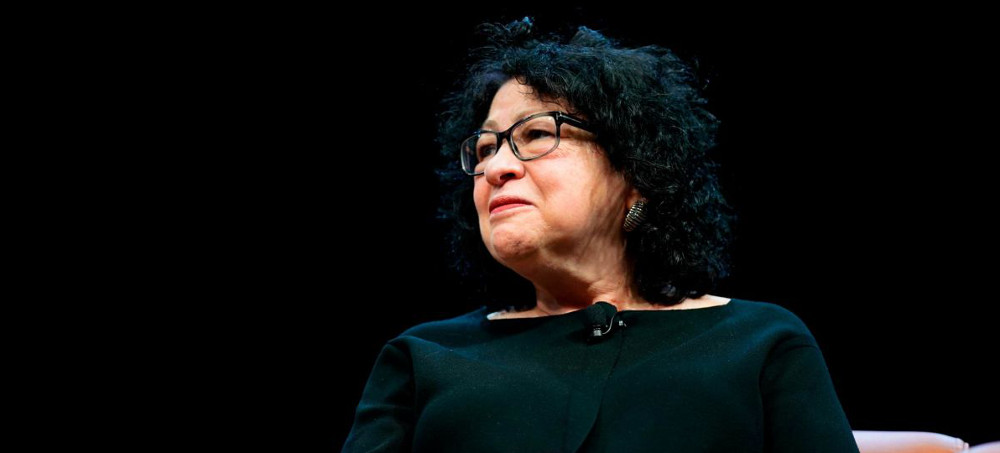 Justice Sonia Sotomayor on April 5, 2022, at Washington University in St. Louis. (photo: Jefff Robertson/AP)
Justice Sonia Sotomayor on April 5, 2022, at Washington University in St. Louis. (photo: Jefff Robertson/AP)
The left-leaning Supreme Court justice vehemently disagreed with the high court's rulings on the separation of church and state.
The critique came as part of her dissenting opinion in the case of Carson v. Makin. The conservative majority’s ruling will allow government funds to go to religious schools in some instances — including those that bar LGBTQ students — over the objection of the state of Maine.
“Today, the Court leads us to a place where separation of church and state becomes a constitutional violation,” Sotomayor wrote.
In its 6-3 decision, the conservative-leaning court ruled that Maine is required to pay religious schools tuition aid in certain situations. Rural families in the state receive taxpayer funds to send their children to a public or private school of their choosing if they don’t live in an area with a public school.
The state of Maine had argued that religious private schools should not be included in the program, citing the First Amendment among its reasons. But the Supreme Court, led by Chief Justice John Roberts, said that excluding such schools from the public benefit violated protections for the free exercise of religion.
“Nothing in the Constitution requires today’s result,” Sotomayor argued. She called the majority opinion “especially perverse” because the case involves public education.
“As this Court has long recognized, the Establishment Clause requires that public education be secular and neutral as to religion,” Sotomayor wrote.
In addition to being nonsecular, the two institutions involved in the case, Bangor Christian and Temple Academy, have implemented policies allowing them to deny LGBTQ students admission. That means, Sotomayor argued, that “while purporting to protect against discrimination of one kind, the Court requires Maine to fund what many of its citizens believe to be discrimination of other kinds.”
Sotomayor went on to recall her own dissent in a related 2017 case that also chipped away at the barrier between church and state.
“In just a few years, the Court has upended constitutional doctrine, shifting from a rule that permits States to decline to fund religious organizations to one that requires States in many circumstances to subsidize religious indoctrination with taxpayer dollars,” she wrote in Tuesday’s dissent.
Her dissent followed one written by Justice Stephen Breyer, who said that he “fear[s]” the Supreme Court has now “effectively abandon[ed]” a “longstanding doctrine” that gave states leeway in deciding when to allow religious organizations access to taxpayers’ money. Both Sotomayor and Justice Elena Kagan signed on to Breyer’s dissent; Sotomayor made additional points in her own opinion.
In the past, the Supreme Court has emphasized the line between church and state, ruling in 1948 that public schools cannot set aside time for weekly religious teachings. Later cases prohibited other religious activities, like readings from the Bible.
The court has yet to rule on another church-and-state case pending this term, involving a former high school football coach who was fired for praying with the young players after their games. However, the court’s conservative majority appeared poised to side with the coach when the case was argued earlier this year.
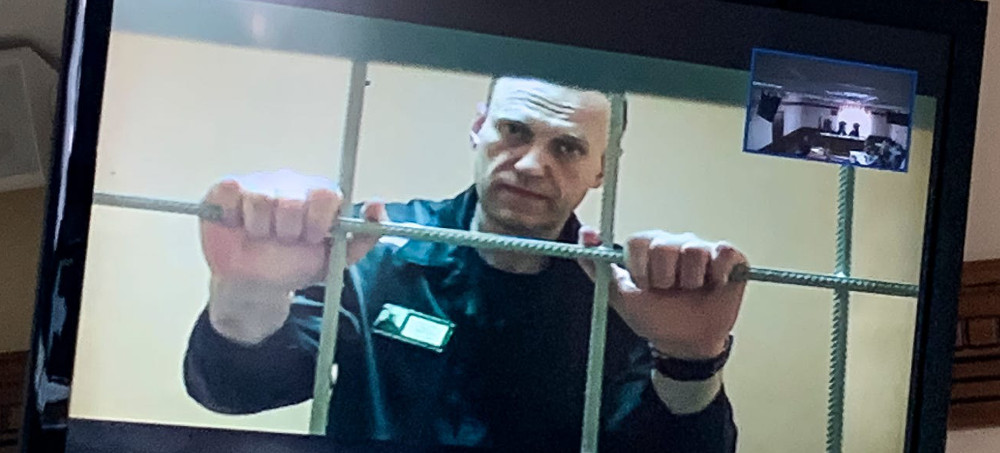 Russian opposition leader Alexei Navalny appears from prison on a video link provided by the Russian Federal Penitentiary Service, at a courtroom in Vladimir, Russia, Tuesday, June 7, 2022. (photo: Vladimir Kondrashov/AP)
Russian opposition leader Alexei Navalny appears from prison on a video link provided by the Russian Federal Penitentiary Service, at a courtroom in Vladimir, Russia, Tuesday, June 7, 2022. (photo: Vladimir Kondrashov/AP)
During an interview with CNN's Jim Sciutto that aired Monday, Dasha Navalnaya detailed the harrowing conditions that Navalny is facing after being transferred to a remote prison earlier this month.
"They fenced off a separate barrack in the area to really create a prison within the prison so that he can't speak publicly and isolate him from any information," Navalnaya said.
She continued: "They don't let him go anywhere — people are not allowed to communicate with him, and this kind of isolation is purely psychological torture for anyone."
Navalny, a prominent critic of Russian President Vladimir Putin, was serving a years-long sentence at a penal colony when he was abruptly transferred in mid-June to an unknown location — startling his allies.
Russian state media then reported that Navalny was moved to a notorious high-security prison in Melekhovo, which is east of Moscow.
"The conditions in the prison are bad," Navalnaya told CNN. "This is one of the most dangerous and infamous high-security prisons in Russia, known for torturing and murdering the inmates."
Navalnaya said neither her family, nor her father's attorneys, were made aware of the new prison transfer before it happened. She said he'll stay behind bars for as long as Putin wants him there because the Russian president wants to keep him silent.
"It, of course, is very concerning because he is one-on-one with the same people — and the same government — that tried to kill him," she said.
Navalny was poisoned in 2020 in an attack widely blamed on Putin. Putin has denied any involvement in Navalny's poisoning. After receiving treatment in Germany, Navalny was arrested upon his return to Russia in early 2021 and charged with violating parole over a past conviction.
His ongoing imprisonment has stirred mass outrage inside Russia and beyond the country's borders.
 Israel's Prime Minister Naftali Bennett said on Monday that Israel's governing coalition has collapsed and the country will hold new elections. (photo: Oren Ben Hakoon/Getty Images)
Israel's Prime Minister Naftali Bennett said on Monday that Israel's governing coalition has collapsed and the country will hold new elections. (photo: Oren Ben Hakoon/Getty Images)
Prime Minister Naftali Bennett says he will step down after lawmakers hold a vote to dissolve parliament next week, and centrist Foreign Minister Yair Lapid will take over as prime minister. Elections are likely to take place in October.
It will be Israel's fifth round of elections in just over three years, and the country's polarizing former leader Benjamin Netanyahu will try to return to power once again.
"We did everything we could to preserve this government," Bennett said in a live televised address Monday. "Believe me, we turned over every stone."
In the middle of Bennett's speech, the room suddenly went dark as the lights went out for a moment.
"How symbolic," Lapid said in the microphone.
Bennett's government collapsed after several lawmakers — mostly his own right-wing Jewish nationalist allies — withdrew their support for the ideologically-mixed coalition that included a secular Jewish party and pro-Palestinian politicians.
The final straw was when Bennett lost his parliamentary majority and could not whip enough votes to extend legal protections — renewed every five years — that granted Jewish settlers in the West Bank rights that Palestinians in the territory do not have: the ability to receive national Israeli health insurance and to practice law and be tried in Israeli civil courts.
Leading human rights groups say this two-tiered legal system for Israeli settlers and Palestinians amounts to apartheid.
Without renewing settler legal protections, Bennett said, "Israel will endure heavy security damage and constitutional chaos. That I could not allow."
By dissolving parliament, the protections will be frozen in place until three months after a new parliament is elected. Bennett said there was "urgency" to the move to avert "the accompanying chaos."
President Biden will be received by the future prime minister, Yair Lapid, on his visit to Israel next month. "Our working assumption is still that the trip will go forward as planned," the U.S. Embassy to Israel told NPR in a statement.
The upcoming elections will likely focus on the question of Netanyahu's potential return to power and the possibility of future Arab-Jewish political partnership.
"While this government was one of Israel's shortest to hold office, it played an historical role by including an Arab party in the coalition and in the decisions made by the national leadership, and therefore paving the way for the possibility of more inclusion by the Arab minority in the political process and Israeli society as a whole," said Yohanan Plesner of the non-partisan Israel Democracy Institute.
In a video statement, Netanyahu decried the outgoing government as reliant on "terror supporters," a slur aimed at the Arab Islamist party that participated in the government.
The head of that party, Mansour Abbas, said he wished to be kingmaker in the next coalition, too.
"This is a historic step. It's still on its way. We have only begun," Abbas said. "We proved it is possible."
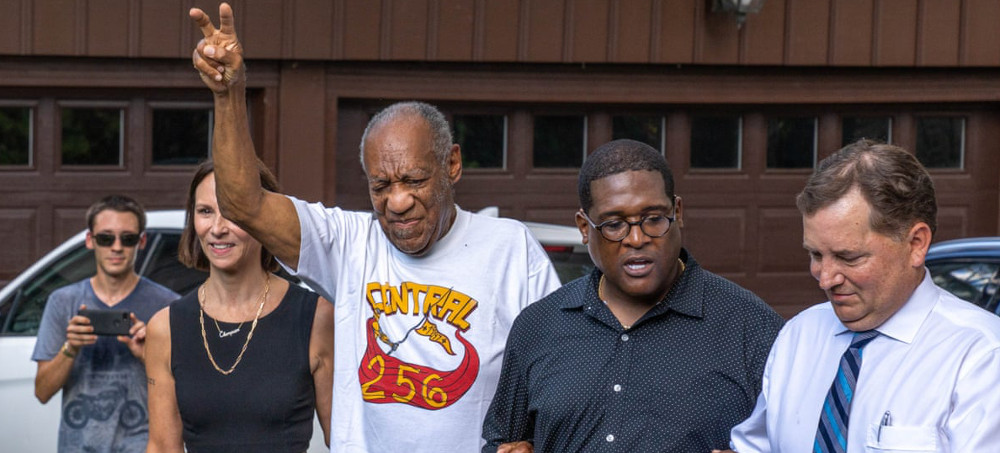 Bill Cosby walks out to the media outside of his Elkins Park, Pennsylvania home Wednesday after the Pennsylvania Supreme Court overturned his sexual assault conviction. (photo: Jim Z/Shutterstock)
Bill Cosby walks out to the media outside of his Elkins Park, Pennsylvania home Wednesday after the Pennsylvania Supreme Court overturned his sexual assault conviction. (photo: Jim Z/Shutterstock)
Civil trial jurors rule in favor of Judy Huth who accused comedian of forcing her to perform a sex act in 1975 when she was 16
Jurors in Los Angeles county ruled in favor of Judy Huth, who is now 64, awarding her $500,000 in a legal defeat for the once-beloved comedian and star of The Cosby Show.
Jurors found that Cosby intentionally caused harmful sexual contact with Huth, whom he reasonably believed was under 18, and that his conduct was driven by unnatural or abnormal sexual interest in a minor. The decision brings to a close one of the final remaining legal claims against 84-year-old Cosby, whom more than 50 women have accused of sexual assault over nearly five decades.
In court filings and in testimony at the trial, Huth said she and a friend met Cosby at a park, and that the actor later took her and her friend to the Playboy Mansion. She testified that Cosby, who was 37 at the time, assaulted her, forcing her to perform a sex act without her consent, a claim the actor has denied.
Huth, who first filed a lawsuit against Cosby in 2014, initially said the incident took place in 1974 when she was 15, but later concluded she was mistaken about the year and that it happened in 1975.
Cosby, who did not appear in person at the trial, denied the allegation. In video of a deposition shown to jurors, Cosby said he did not remember Huth. But he said the incident could not have happened because he would not have pursued sexual contact at that time with someone who was under age 18.
Jennifer Bonjean, Cosby’s attorney, challenged Huth’s account throughout the trial, calling her revised timeline “trial by ambush”.
Cosby’s spokesperson, Andrew Wyatt, said the actor’s team plans to appeal the jury’s decision, but described it as a win for the actor, noting that it was far less than the $8m Huth’s attorney, Gloria Allred, sought.
“This is a huge victory and the Cosbys are so happy with the representation of Jennifer Bonjean,” Wyatt said. “Allred was trying to get $8m. They did not get punitive damages. That is a huge win.”
Allred, Huth’s lawyer, thanked the jury for its verdict and praised her client for her “courage and many sacrifices to win justice in this case”.
“We are honored to represent her,” she said. “I want to thank all of the women who spoke out over the years, and refused to be silent in the face of what they believed to be injustice and sexual abuse by powerful men … We are proud of Ms Huth and our victory against Bill Cosby.”
The trial took place nearly a year after the actor was freed from prison in Pennsylvania, when his conviction on charges of drugging and sexually assaulting another woman were overturned. The state’s supreme court overturned Cosby’s conviction on a legal technicality last year and released him just two years into his sentence, dealing a painful blow to his accusers.
Rainn, an anti-sexual violence non-profit, praised the Los Angeles jury’s decision.
“Once again, a jury has found that Bill Cosby committed sexual assault. Ms Huth’s courageous testimony helped the jury reach this decision and we commend her for her bravery. Today’s verdict shows survivors that perpetrators, even powerful ones, can be held accountable,” said Erinn Robinson, a Rainn spokesperson.
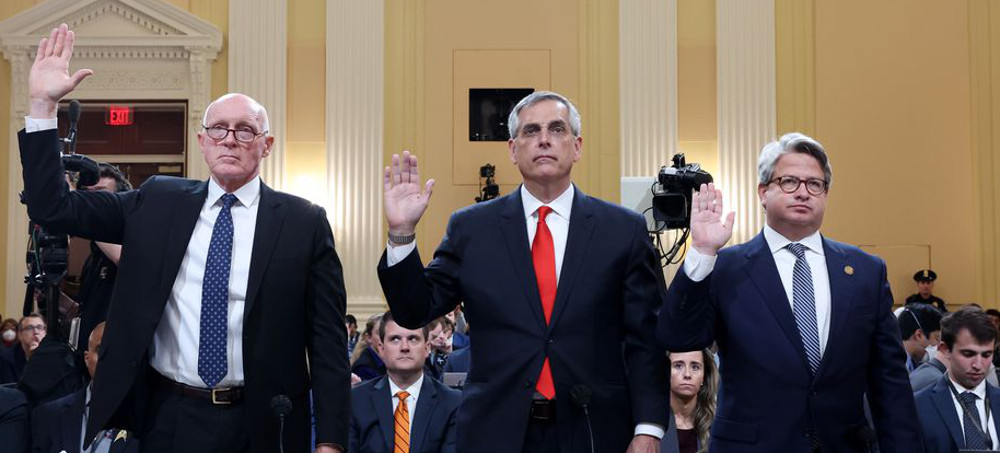 Arizona House Speaker Rusty Bowers, Georgia Secretary of State Brad Raffensperger, and Georgia’s chief operating officer for the Secretary of State, Gabriel Sterling, were sworn in during Tuesday’s hearing. (photo: Michael Reynolds/Getty Images)
Arizona House Speaker Rusty Bowers, Georgia Secretary of State Brad Raffensperger, and Georgia’s chief operating officer for the Secretary of State, Gabriel Sterling, were sworn in during Tuesday’s hearing. (photo: Michael Reynolds/Getty Images)
ALSO SEE: Ron Johnson Caught Pretending to Be on a Call
to Dodge Reporters After January 6 Hearing
In the fourth hearing of the January 6 committee, state officials badgered by Trump to commit election fraud were on the stand.
The hearing provided new details about the scope of the latter plot in particular, which included efforts to pressure Vice President Mike Pence and was knowingly based on falsehoods. Below are some takeaways from it.
1) Sen. Ron Johnson’s slate of electors and the sprawling final scheme
The lobbying effort by Trump allies in Congress to keep him in power continued right until the joint session at the Capitol on January 6. Rusty Bowers, the Republican speaker of the Arizona House and the first witness to testify Tuesday, said that Rep. Andy Biggs (R-AZ) lobbied him that morning to support decertifying the state’s electors whose votes would be counted that day.
The committee delved into just how much coordination the Trump campaign had done, in multiple states and in conjunction with party and state officials and members of Congress ahead of January 6, on its “alternate slates of electors” scheme.
The campaign worked with allies in states with election results they wanted to contest, to come up with alternate rosters of electors intended to serve as substitutes for the legitimate representatives to the Electoral College, who had already cast their votes for Joe Biden. The idea was that, when Pence gave the word, somehow these prepared slates of electors would replace these legitimate electoral votes. (For more on the fake electors plan, here’s an explainer from Vox’s Andrew Prokop in 2020, when the plan was being executed.)
The #Jan6thCommittee presented a Jan. 6, 2021 text exchange between a Sen. Ron Johnson aide and a Pence aide regarding a list of pro-Trump electors that Johnson purportedly wanted to hand deliver to the VP. pic.twitter.com/qIY2adlYwR
— Tim Hanrahan (@TimJHanrahan) June 21, 2022
In perhaps the biggest revelation of the day, the committee published text messages between aides to Pence and Sen. Ron Johnson (R-WI) in which a Johnson staffer asked if his boss could give the vice president the paperwork from two slates of fake electors on the Senate floor. The Pence aide responded, “Do not give that to him.”
In a tweet, a Johnson spokesperson said that “the senator had no involvement in the creation of an alternate slate of electors and had no foreknowledge that it was going to be delivered to our office,” but did not deny he had intended to deliver the slates to Pence.
Although the committee had previously revealed that at least one member of Congress, Rep. Scott Perry (R-PA), had sought a pardon from Trump for his efforts to overturn the election, the hearing provided new details on just how Republican elected officials were actively abetting Trump’s efforts.
2) The absurd adventures of the fake electors
The committee also detailed the Trump campaign’s slapdash attempts to find fake electors as his campaign lawyers — those on what former campaign manager Bill Stepien described last week as on “Team Normal” — backed away.
While Bowers simply derided the fake electors in Arizona as “The Gang That Couldn’t Shoot Straight,” the efforts in other states were just as poorly thought out. In Michigan, former state Republican Party chair Laura Cox described a Trump campaign official’s plan to have electors hide overnight in the state capitol, to comply with a statutory requirement that electoral votes be cast in a state legislative chamber. She said she responded that that plan “was insane and inappropriate.”
One designated fake elector, Robert Sinners of Georgia, said in a taped deposition that he had been used by the Trump campaign in this effort as “a useful idiot” and “rube.” He said he was unaware that this was not a procedural backstop to preserve options if the Trump campaign’s long-shot litigation claiming election fraud succeeded, but rather an explicit attempt to thwart the will of the voters.
Such efforts came after Trump lawyers had washed their hands of the endeavor and handed it over to unofficial advisers like attorney John Eastman. Justin Clark, a top lawyer on the campaign, described efforts to create fake electoral slates in the states where the campaign had no ongoing litigation as “inappropriate,” while Matt Morgan, the campaign’s general counsel, said he wrote in an email to lawyer Ken Chesebro that “you are responsible for the Electoral College moving forward.” Morgan said in a taped deposition aired during the hearing that “that was my way of taking my responsibility to zero.”
3) A fresh Trump lie to frame the hearing
Less than an hour before the hearing began, Trump put out a statement attacking Bowers and claiming that the Arizona speaker had told him “that the election was rigged and that I won Arizona.”
This meant that the first questions to Bowers from Rep. Adam Schiff (D-CA) were about the statement. Speaking under oath, Bowers testified that Trump’s statement was false. “I did have a conversation with the president but that certainly isn’t it,” Bowers said. He went on to insist that “Anywhere, anyone, anytime, who said that I said the election was rigged, that would not be true.”
NEW: Responding to statement from former Pres. Trump, Arizona House Speaker Rusty Bowers says, "I did have a conversation with the president. That certainly isn't it."
— ABC News (@ABC) June 21, 2022
"Anywhere, anyone, anytime has said that I said the election was rigged—that would not be true." pic.twitter.com/RdekDJeYcJ
It marked the second consecutive hearing establishing that Trump had knowingly put out a false statement. In a hearing last week, the committee heard testimony about a statement Trump released on January 5, 2021, falsely claiming that Pence agreed with him about overturning the 2020 election. The statement followed an Oval Office meeting where Pence had explicitly told Trump that he would not cooperate on January 6 and would do his constitutional duty to simply preside over the joint session of Congress.
After the hearing, Schiff compared Trump’s Tuesday statement to a tweeted attack during his first impeachment trial on the former US Ambassador to Ukraine as she was testifying in a hearing. “It was like a replay of what he did with Marie Yovanovitch,” Schiff told Vox. “It’s just his modus operandi.”
4) Giuliani admitted there was no evidence of fraud
Trump and his top attorneys, Rudy Giuliani, Jenna Ellis, and John Eastman, were repeatedly in touch with Bowers and pushing him to take various steps to nullify Biden’s win in Arizona and declare Trump the winner instead.
Trump’s team viewed Bowers’s support as necessary to overturn the election there because any effort to substitute the state’s legitimate electors would require a vote by the state legislature. Bowers testified that despite his constant requests for evidence of voter fraud from the Trump campaign, they never provided any such evidence.
This culminated, Bowers said, when Giuliani conceded to him, “We’ve got lots of theories. We just don’t have any evidence.”
5) The toll of going against Trump
Bowers offered up emotional testimony Tuesday, particularly when it came to the reasons he refused to accede to repeated entreaties from Trump and his attorneys to assist in their efforts to overturn the election. Bowers, a Mormon, cited his faith several times as a reason he refused to go along with Trump’s plot.
“It is a tenet of my faith that the Constitution is divinely inspired, one of my most basic foundational beliefs.” He added that taking actions contrary to the Constitution is “foreign to my very being.”
Bowers said that he has been subject to an ongoing campaign of harassment as a result. He testified that there are weekly protests at his house that include trucks driving by while playing videos that label him “a pedophile, a pervert [and] a corrupt politician.”
Bowers was one of three Republican officials to testify before the committee in the first panel of witnesses, along with Brad Raffensperger, the Georgia secretary of state, and his top aide, Gabriel Sterling. Raffensperger testified about how his wife received “sexualized” threatening texts and that someone even broke into the house of his late son’s widow.
The only witness in the second panel was Shaye Moss, a former Georgia election worker whose mother, Ruby Freeman, was also an election worker. Both women faced a barrage of threats due to a Trump-promoted conspiracy theory about ballot counting in the state.
"It's turned my life upside down....I don't want anybody knowing my name....All because of lies."
— ABC News (@ABC) June 21, 2022
Ex-Fulton County election worker Shaye Moss says being falsely accused by Rudy Giuliani and others of election fraud has affected her life "in every way." https://t.co/XXhJAyHp2w pic.twitter.com/I4GCf5f7MX
Freeman, who Trump called out by name, testified in a taped deposition that she moved out of her home for a period after the FBI recommended she do so.
“I won’t even introduce myself by my name anymore,” Freeman said. “I get nervous when I bump into someone. I know in the grocery store who says my name — I am worried about who is listening. ... I have lost my name and I have lost my reputation. I have lost my sense of security. All because a group of people starting with number 45 [Trump] and his ally, Rudy Giuliani, decided to scapegoat me — to push their own lies about how the presidential election was stolen.”
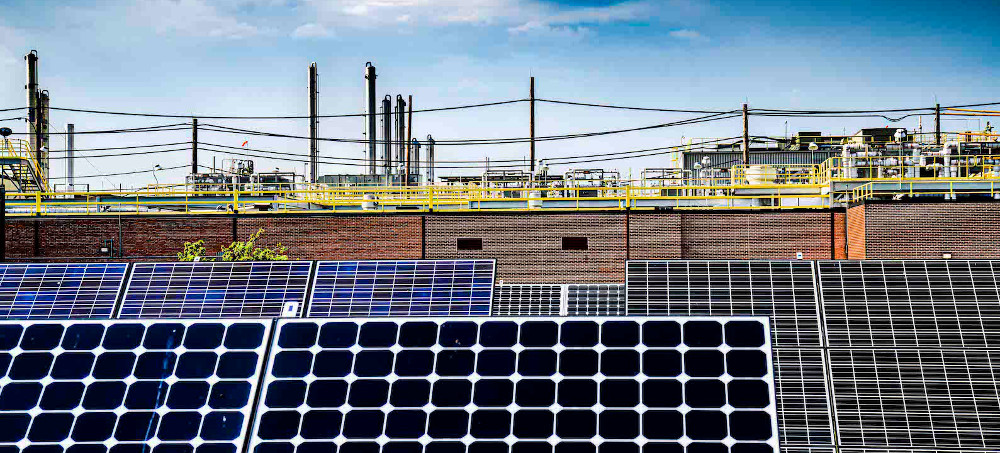 Part of Hemlock Semiconductor’s manufacturing facility. (photo: Hemlock Semiconductor)
Part of Hemlock Semiconductor’s manufacturing facility. (photo: Hemlock Semiconductor)
Some manufacturers are going the extra mile to clean up emissions from a critical material in solar panels' supply chain.
If that plan is successful, it would not only demonstrate the U.S. is, in fact, able to make solar panels with domestically sourced materials — a key policy goal of the Biden administration. It would also show that polysilicon refining, the most energy-intensive step in solar manufacturing, could be made considerably greener in the process.
In the pantheon of climate solutions, low-carbon polysilicon may not sound particularly sexy. But it has become a hot topic in the world of solar as corporations and governments start thinking seriously about how to drive their emissions all the way to zero, including in the so-called upstream supply chains that provide materials and components for renewable energy. Already, solar photovoltaic, or PV, panels generate among the lowest carbon emissions of any energy source out there over their entire life cycle, including manufacturing. But as the industry grows, even the relatively small emissions associated with manufacturing PV panels could become significant in aggregate, potentially peaking at levels comparable to the current yearly emissions of large industrialized nations like France or Germany.
A recent study found that in a scenario where the world deploys solar rapidly, PV production could lead to 25 to 30 billion tons of cumulative carbon dioxide emissions by the middle of the century, eating up roughly 10 percent of the remaining carbon budget for limiting global warming to 1.5 degrees Celsius (2.7 degrees Fahrenheit). If we don’t rapidly embrace renewables like solar, we have little chance of meeting that climate target. Still, it is possible to increase our odds by cleaning up polysilicon production, which accounts for roughly half of the climate impact of solar PV.
REC Silicon is showing how the industry might do that. The company’s polysilicon production facility in Moses Lake, Washington, uses low-emissions hydropower from the local electric grid, instead of the coal that’s often used to power polysilicon refineries in China. What’s more, instead of using the energy-intensive process to purify silicon that’s standard in the industry, the Moses Lake facility has pioneered the commercialization of an alternative process that REC Silicon claims uses up to 90 percent less energy.
The Moses Lake facility has been closed since 2019 due to Chinese import tariffs that priced the silicon maker out of the solar market. Now, thanks to Hanwha’s investment, REC Silicon has begun the process of bringing the facility back online.
“We have a very stable, low cost of power to produce polysilicon that’s also very low carbon,” REC Silicon CEO James May told Grist. “And that’s what we want to do.”
To understand why polysilicon manufacturing produces emissions, you have to understand how it works. Originating from quartz, a humble, abundant mineral, polysilicon is a highly refined form of silicon that converts sunlight into electrons inside a PV panel. To make it, manufacturers heat quartz in a furnace to produce metallurgical-grade silicon, which is about 99 percent pure. Typically, metallurgical-grade silicon then gets transformed into a gas, which is released into a superheated reactor where it resolidifies onto seed rods as polysilicon, a form of silicon upwards of 99.999999 percent pure. This process, known as the Siemens process, is how more than 95 percent of polysilicon is refined around the world today, according to the clean energy research firm BloombergNEF.
While the Siemens process has been around for decades and is considered the most reliable way to refine polysilicon, it has a downside. As the silicon rods are forming at the center of the reactor, the reactor walls need to be kept cool to prevent the silicon from crystallizing there. Maintaining that temperature difference is “really energy intensive,” Jenny Chase, who heads solar analysis at BloombergNEF, told Grist. To make polysilicon affordably, companies set up their refineries in places with access to cheap and abundant electricity. In China, where 78 percent of global polysilicon production occurred last year, this means regions where the electric grid includes lots of coal.
“Most people are very aware of what happens with solar once it’s put in the field — that it generates zero-carbon electricity,” said Michael Parr, the executive director of the Ultra-Low Carbon Solar Alliance, an industry group focused on driving down emissions across the solar supply chain. “Most people don’t know that upstream, in manufacturing, there can be quite high carbon emissions, particularly in the Chinese supply chain.”
One way for the solar industry to clean up this supply chain is through improvements in manufacturing efficiency. This is already happening: Data shared by BloombergNEF shows that between 2014 and 2019, the amount of electricity needed to refine a kilogram of silicon declined 22 percent. At the same time, the silicon content of solar panels is falling as manufacturers continue to make solar cells — the individual, wafer-like pieces of silicon inside a solar panel — thinner and lighter. And the efficiency of those cells, or their ability to convert sunlight into electricity, is steadily rising.
“The efficiency of the solar cells has improved by about 50 percent in the last 25 years, and amount of silicon we use is cut down by a factor of two or three,” Meng Tao, a solar sustainability researcher at Arizona State University, told Grist.
Greater efficiency means less energy and emissions are expended to manufacture a solar panel. Further climate gains are possible if manufacturers power their operations renewably. Right now, U.S. electric grids tend to be less carbon-intensive than their Chinese counterparts, meaning there’s a good climate case for onshoring the energy-intensive steps like polysilicon production. That hasn’t escaped the Biden administration: In a February report on the solar supply chain, the U.S. Department of Energy, or DOE, identified ramping up polysilicon refining as the top thing the U.S. could do to secure a stable solar supply chain. Such an industry, the DOE noted, could take advantage of low-emissions hydropower in the Northwest and elsewhere.
“Economics is on our side here,” Garrett Nilsen, acting director of the Solar Energy Technologies Office at DOE, told Grist in an email. “Hydropower is one of the cheapest forms of electricity in the country, so polysilicon producers naturally locate their plants accordingly.” The DOE, he said, is also investing in programs to deploy additional wind and solar power more cheaply around the country, potentially creating new renewable energy hotspots where polysilicon makers could set up shop.
When it comes back online, REC Silicon’s Moses Lake facility will use hydropower produced on Washington State’s Columbia River to produce polysilicon for solar panels. The largest U.S.-based polysilicon manufacturer, Hemlock Semiconductor, produces polysilicon for both the solar and the semiconductor industry in Hemlock, Michigan. There, the electric grid already includes a significant amount of hydroelectric storage capacity, and it’s getting steadily cleaner as the local utility phases out coal and brings more solar energy online. Hemlock solar commercial manager Phil Rausch told Grist that per kilowatt-hour of energy used, the emissions associated with the electricity the company purchases are about half of its competitors’ electricity emissions.
Beyond improvements in manufacturing efficiency and getting power from greener grids, a handful of polysilicon makers have turned to alternative processes that are less energy intensive than the Siemens process. Chief among those is the so-called “fluidized bed reactor,” or FBR, process REC Silicon uses at its Moses Lake facility. Hot, silicon-rich gas is fed into a chamber containing pellets of silicon, which grow in size as more silicon crystallizes on them. Because heat is introduced from outside the reactor, no cooling is required, allowing considerable energy and cost savings, according to May.
Industry experts say it is more difficult to produce ultra-high-purity polysilicon with FBR technology compared with the Siemens process, limiting its adoption in the industry. Rausch of Hemlock said that his company investigated the FBR process “extensively” over the last decade but ultimately determined that the polysilicon it produced “did not meet the needs of the industry.” May, however, is confident that REC Silicon can use the method to make polysilicon that meets the increasingly stringent purity requirements of solar manufacturers thanks to a series of recent upgrades to its Moses Lake facility.
Parr of the Ultra-Low Carbon Solar Alliance is cautiously optimistic. FBR “is a more difficult technology to get better purity from,” he said, but REC Silicon has spent years improving its process. “I think like any technology, it takes a while to perfect it, but it is inherently lower energy, lower carbon technology, so that’s promising.”
Any polysilicon maker that can deliver a greener product — whether that’s due to more efficient production methods or cleaner power sources — is likely to have a growing advantage in the solar market as companies or governments start paying more attention to supply chain emissions.
“We’re already seeing the downstream buyer becoming much more sensitive to the embodied carbon in the supply chain,” Rausch said. As an example, he notes that several years back, when France began taking the carbon footprint of solar panels into account in its public procurement process for clean energy, companies buying polysilicon from Hemlock started doing better in that market. New labeling schemes, like an eco-label for solar that the Global Electronics Council is developing in partnership with the Ultra-Low Carbon Solar Alliance, are likely to drive further interest in clean polysilicon.
Efforts to make solar manufacturing more sustainable shouldn’t detract from the need to deploy solar power as quickly as possible, says Garvin Heath, an energy sustainability researcher at the National Renewable Energy Laboratory, or NREL. Across the entire life cycle, NREL researchers have found that solar PV already generates 10 to 20 times lower carbon emissions than fossil fuel energy sources like gas and coal. Solar is already a critical tool for fighting climate change, regardless of manufacturing emissions.
At the same time, the industry should do everything in its power to keep its emissions as low as possible, considering how little carbon we have left in the bank to avoid crossing dangerous climate thresholds.
“We shouldn’t stop deploying PV because we want to make it better,” Heath said. “We should deploy as much as possible and make it better.”
Follow us on facebook and twitter!
PO Box 2043 / Citrus Heights, CA 95611



No comments:
Post a Comment
Note: Only a member of this blog may post a comment.